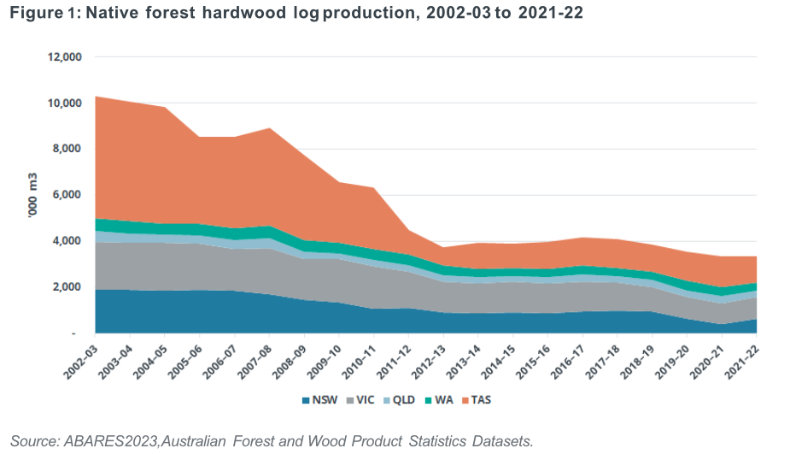A recent report details Forestry Corporation’s significant financial losses, costing taxpayers millions in subsidies, as well as degrading the environment. Suzanne Arnold reports.
A Frontier Economics report shows that the state-owned corporation had received tax payer funded grants worth $246.9m since the 2019//20 financial year and operated with a loss of $28.2m in the same period.
The report notes native forest logging has become
financially risky for governments and their forest harvesting activities eat away at the increasingly scarce environmental value of Australia’s dwindling forests.
The size of the native forest industry in Australia is declining. Roundwood production (saw logs and pulp logs) from native forests has dropped by over 60%, and hardwood production falling from over 10 million cubic metres per year to less than 4 million.

Bushfire recovery time
The report goes on to say that “key pressures on supply are bushfires (noting that the frequency and severity of fires are predicted to increase), continuing environmental reservation such as the proposed Great Koala National Park, court challenges to forest access and over-harvesting.”
It found that the 2019 bushfires compounded many years of poor financial performance and losses by the corporation with the costs of production exceeding revenue.
Catastrophic fires of 2019-2020 burnt 5.5 million hectares, including about 50 percent of the state’s native forests, with millions of species incinerated. Yet the forestry industry continued logging in spite of a cabinet in confidence report recommending no logging in many forestry zones.
Scientists have demanded that native forests be given time to recover from the massive damage to biodiversity and forest ecosystems. The previous NSW Government strenuously resisted all calls for a moratorium, however.
Secret Forest: Australia rivals The Congo on deforestation, blocks media access to world scientists
Carbon credits more important?
Ironically, in December 2022, with an election looming, NSW Liberal ministers sought support from the Federal Government to generate carbon credits by ending native forest logging.
The proposal recommended funds be invested to manage existing national parks, create new ones and develop plantations delivering “major ecological benefits for species such as koalas, greater gliders and other threatened species, as well as significant economic benefits to regional Australia.”
The proposal was rejected by the Federal Government and blocked by the Nationals before it could go to Cabinet.
Forest backflip. Minns junks native forests protection because … carbon credits, que?
In a previous Frontier report on native forests in Southern NSW, co-author Professor Andrew Macintosh said all state forestry corporations around the country were in the same position,
bleeding cash and with no foreseeable way to turn around.
The report estimated stopping native forest logging in the state’s south could produce a net economic benefit of about $60m, while reducing net greenhouse gas emissions by almost 1 million tonnes per year over the period 2022-2024.
“If this was a true commercial operation, it would be closed. It is only surviving because the state government is essentially choosing to underwrite it for an increasingly small number of jobs,” said Professor Macintosh.
The value of flora and fauna
With no government willingness to give wildlife an economic value other than as a biodiversity offset for development projects, the ongoing loss of koalas has driven global concern.
Koala habitat contains significant biodiversity, increasingly driven to localised extinctions by logging. A landmark study by the University of Newcastle in 2021 estimated the biodiversity value of koalas alone at $530m for the NSW population, and $1.7b for the whole country.
At a recent budget estimates hearing, Penny Sharpe, NSW Minister for the Environment, ducked answering a question on forestry losses from Liberal MLC, Natalie Ward, deputy liberal leader:
Natalie Ward: “Would it be your view, as the environment Minister, that native forest logging remains economically and environmentally sustainable in New South Wales?“
Penny Sharp: “I think there are a whole range of things that you can unpack in relation to that. I know that some of this was traversed with the Treasurer the other day. Myself and Minister Moriarty are working on the forestry road map into the future. We’re looking at all of those issues. I am aware that there are some subsidies that go to native forest logging, and all of those will be dealt with as we keep talking about this.“
Former Coalition environment minister Robert Hill this week joined former ministers Peter Garrett and Rob Debus, former WA Premier Geoff Gallop and many others to call for a ban now. According to Debus, “the best thing we can do to protect our threatened wildlife and to take greenhouse gas out of the atmosphere is to quickly and fairly bring this failing industry to an end.
It’s time to say enough is enough.
Update, November 20: In a case brought by the North East Forest Alliance (NEFA), the Land and Environment Court ruled today that “Individual logging plans are not required to comply with Ecologically Sustainable Forest Management as this is considered in the general CIFOA* approval.”
NEFA spokesperson Dailan Pugh said that this “leaves it up to the Government to decide whether they will intervene to save this nationally important Koala population from extinction.”
* Coastal Integrated Forestry Operations
New documents: EPA and Forestry Corporation at loggerheads over forests, koala protection
Sue Arnold is a former Fairfax investigative journalist. Her speciality is environmental issues and she is a regular contributor to Australian and international publications. Sue heads up Australians for Animals Inc., a 32-year-old wildlife charity and is Founder and CEO of the California Gray Whale Coalition based in San Francisco.

